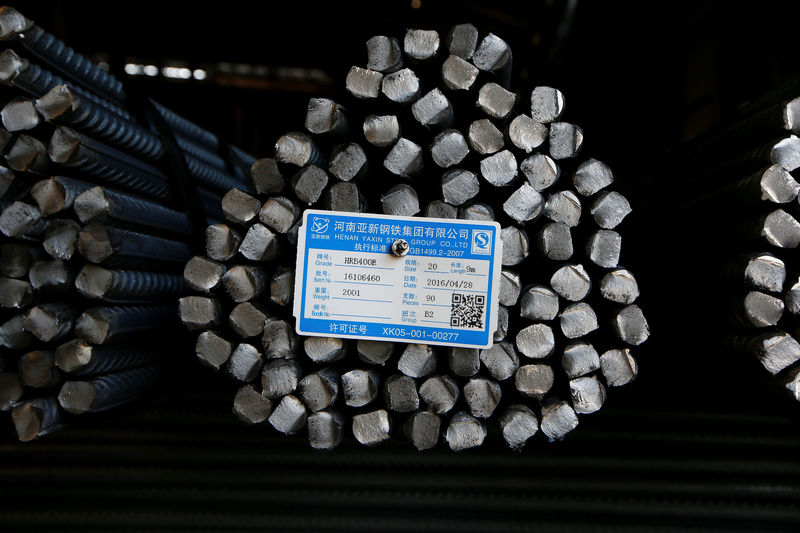* Dalian coke climbs to highest since December 2013
* Low steel inventories pushing Chinese mills to lift output (Adds comment on falling yuan, updates prices)
By Manolo Serapio Jr
MANILA, Oct 25 (Reuters) - Chinese iron ore futures surged 6 percent to the highest in more than two years on Tuesday amid rising steel prices, playing catch-up with the strength in coking coal.
Firm steel demand in the world's top consumer and producer and higher raw material costs are supporting prices of the commodity. A shortage in coking coal has driven prices higher, but iron ore is gradually keeping up.
The most-traded January iron ore on the Dalian Commodity Exchange climbed 6 percent to close at the exchange-set ceiling of 471.50 yuan ($70) a tonne, its loftiest since August 2014.
The most-active January coking coal DJMF7 ended 5.1 percent higher at 1,300 yuan per tonne after touching a life-of-contract high of 1,313 yuan a tonne. Coke DCJcv1 soared by its 7 percent upside limit to 1,680 yuan per tonne, the highest since December 2013.
"Overall market participants remain bullish about the outlook for coking coal as demand from steel mills remains healthy because steel inventory is low and steel mills are raising prices to pass on the raw material cost increase," Argonaut Securities analyst Helen Lau said in a note.
Other analysts also attributed the strength in Chinese commodity futures to a weaker yuan, which held near six-year lows on Tuesday. Shanghai-traded base metals also advanced.
"Commodities futures that have been relatively weaker are driven by those that have surged due to the supply-side reform, and the depreciation in yuan is also an important factor, which has driven up commodities broadly and opened the import window for copper," said Wu Ren, research director at Nanhua Futures in Hangzhou.
The most-active rebar on the Shanghai Futures Exchange SRBcv1 closed up 4.1 percent at 2,569 yuan a tonne, after earlier touching a two-month peak of 2,587 yuan.
Low steel inventories are spurring Chinese mills to ramp up output, boosting demand for raw materials iron ore and coking coal.
Rebar inventories have declined this year versus past years. The supply is at 3.97 million tonnes as of Monday, according to data from industry consultancy Steelhome. That is down from the three-year average of 5.39 million tonnes. SH-TOT-RBARINV
But unlike coking coal which is expected to remain supported by a severe supply shortage in China even as the government moves to tackle overcapacity, the supply of iron ore may remain high.
Lau said while iron ore prices are expected to benefit from firmer steel demand in the short term, continuously rising output from top supplier Australia should increase supply to China in the current quarter.
Stockpiles of imported iron ore at China's major ports stood at 105.8 million tonnes as of Oct. 21, the most since July, according to SteelHome. SH-TOT-IRONINV
Iron ore for delivery to China's Tianjin port .IO62-CNI=SI rose 0.5 percent to $58.70 a tonne on Monday, the strongest since Sept. 5, according to data from The Steel Index.
The spot iron ore benchmark has gained almost 37 percent this year. But spot Australian premium hard coking coal
.PHCC-AUS=SI has surged 214 percent this year to $245.50 a tonne on Monday.
($1 = 6.7763 Chinese yuan)
